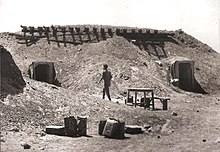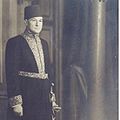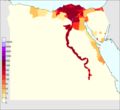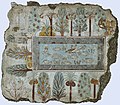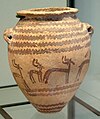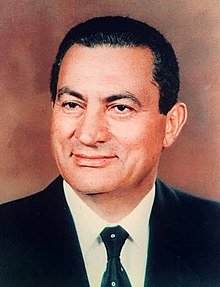Egypt Arabic : مصر Miṣr [mesˁr] ⓘ Egyptian Arabic pronunciation: [mɑsˤr] Arab Republic of Egypt , is a country spanning the northeast corner of Africa and the Sinai Peninsula in the southwest corner of Asia . It is bordered by the Mediterranean Sea to the north , the Gaza Strip of Palestine and Israel to the northeast , the Red Sea to the east, Sudan to the south , and Libya to the west . The Gulf of Aqaba in the northeast separates Egypt from Jordan and Saudi Arabia . Cairo is the capital and largest city of Egypt , while Alexandria , the second-largest city, is an important industrial and tourist hub at the Mediterranean coast . At approximately 107 million inhabitants, Egypt is the 14th-most populated country in the world , and the third-most populated in Africa.
Egypt has one of the longest histories of any country, tracing its heritage along the Nile Delta back to the 6th–4th millennia BCE. Considered a cradle of civilisation , Ancient Egypt saw some of the earliest developments of writing, agriculture, urbanisation, organised religion and central government. Egypt was an early and important centre of Christianity , later adopting Islam from the seventh century onwards. Cairo became the capital of the Fatimid Caliphate in the tenth century, and of the provincial capital of the Mamluk Sultanate in the 13th century. Egypt then became part of the Ottoman Empire in 1517, before its local ruler Muhammad Ali established modern Egypt as an autonomous Khedivate in 1867.
The current government, a semi-presidential republic led by Abdel Fattah el-Sisi since he was elected in 2014, has been described by a number of watchdogs as authoritarian and responsible for perpetuating the country's poor human rights record . Islam is the official religion and Arabic is official language. Egypt is considered to be a regional power in the Middle East, North Africa and the Muslim world , and a middle power worldwide. It is a developing country . Egypt is a founding member of the United Nations, the Non-Aligned Movement , the Arab League , the African Union , Organisation of Islamic Cooperation , World Youth Forum , and a member of BRICS . (Full article...
The Battles of Fort Budapest Hebrew : מעוז בודפשט ) refer to two attempts by the Egyptian Army to capture Fort Budapest, part of Israel 's Bar Lev Line , during the Yom Kippur War . The first attempt took place at noon on October 6, 1973, with the start of Operation Badr , but failed due to Israeli Air Force intervention. The second attempt took place on October 15, at the onset of Operation Stouthearted Men , the Israeli military operation to cross the Suez Canal . Despite significant setbacks caused by poor sea conditions, the second attack was on the verge of success when the Israeli Air Force once again intervened, and this, coupled with Israeli reinforcements, repelled the Egyptian attack. (Full article...
The following are images from various Egypt-related articles on Wikipedia.
Image 1 The
Edwin Smith surgical papyrus describes anatomy and medical treatments, written in
hieratic ,
c. 1550 BC . (from
Ancient Egypt )
Image 2 The "weighing of the heart" scene from the
Book of the Dead (from
Egypt )
Image 4 Early tomb painting from
Nekhen ,
c. 3500 BC , Naqada, possibly Gerzeh culture (from
Ancient Egypt )
Image 5 Wooden figures of soldiers, from the tomb of nomarch
Mesehti (
11th dynasty ) (from
Ancient Egypt )
Image 6 A figure wearing the red crown of Lower Egypt, most probably
Amenemhat II or
Senwosret II . It functioned as a divine guardian for the
imiut ; the divine kilt suggests that the statuette was not merely a representation of the living ruler. (from
Ancient Egypt )
Image 8 Naguib Mahfouz , the first Arabic-language writer to win the Nobel Prize in Literature (from
Egypt )
Image 9 Egyptian honour guard soldiers during a visit of U.S. Navy Adm. Mike Mullen (from
Egypt )
Image 10 Protesters from the Third Square movement, which supported neither the former Morsi government nor the Armed Forces, 31 July 2013 (from
Egypt )
Image 11 The
Qattara Depression in Egypt's north west (from
Egypt )
Image 12 Temple of Derr ruins in 1960 (from
Egypt )
Image 13 Hosni Mubarak — president of Egypt from 1981 to 2011 (from
Egypt )
Image 14 Hieroglyphs on stela in
Louvre ,
c. 1321 BC (from
Ancient Egypt )
Image 15 Change in per capita GDP of Egypt, 1820–2018. Figures are inflation-adjusted to 2011 International dollars. (from
Egypt )
Image 18 The
Fayum mummy portraits epitomize the meeting of Egyptian and Roman cultures. (from
Ancient Egypt )
Image 19 Tanoura dancers performing in Wekalet El Ghoury, Cairo (from
Egypt )
Image 20 Smart Village , a business district established in 2001 to facilitate the growth of high-tech businesses (from
Egypt )
Image 21 Model of a household porch and garden,
c. 1981–1975 BC (from
Ancient Egypt )
Image 22 President el-Sisi with US President
Joe Biden , 11 November 2022 (from
Egypt )
Image 23 Salah Zulfikar , film star (from
Egypt )
Image 24 Tourists riding an
Arabian camel in front of
Pyramid of Khafre . The
Giza Necropolis is one of Egypt's main tourist attractions. (from
Egypt )
Image 25 Tutankhamun's burial mask is one of the major attractions of the
Egyptian Museum of Cairo. (from
Egypt )
Image 26 Ruins of Deir el-Medina (from
Ancient Egypt )
Image 27 Lower-class occupations (from
Ancient Egypt )
Image 28 British infantry near
El Alamein , 17 July 1942 (from
Egypt )
Image 29 Illustration of various types of capitals, by
Karl Richard Lepsius (from
Ancient Egypt )
Image 30 A crowd at Cairo Stadium watching the
Egypt national football team (from
Egypt )
Image 31 Egyptian literacy rate among the population aged 15 years and older by UNESCO Institute of Statistics (from
Egypt )
Image 32 The preserved Temple of Horus at Edfu is a model of Egyptian architecture. (from
Ancient Egypt )
Image 33 The
Giza Necropolis is the oldest of the
ancient Wonders and the only one still in existence. (from
Egypt )
Image 34 Egyptian President
Gamal Abdel Nasser in Mansoura, 1960 (from
Egypt )
Image 35 Prominent Egyptian dissident
Alaa Abd El-Fattah was sentenced to five years of imprisonment in December 2021. (from
Egypt )
Image 36 Egyptians celebrated feasts and festivals, accompanied by music and dance. (from
Ancient Egypt )
Image 37 Aziz Pasha Abaza , poet from the aristocratic literary Egyptian family the
House of Abaza of
Circassian Abazin origin (from
Culture of Egypt )
Image 38 Khafre enthroned (from
Ancient Egypt )
Image 39 The
Egyptian Museum of Cairo (from
Egypt )
Image 42 The
Amr ibn al-As mosque in Cairo, recognised as the oldest in Africa (from
Egypt )
Image 43 Green irrigated land along the Nile amidst the desert and in the delta (from
Egypt )
Image 44 Egyptian
tomb models as funerary goods (from
Ancient Egypt )
Image 45 Cairo grew into a
metropolitan area with a population of over 20 million (from
Egypt )
Image 46 The
Al-Hakim Mosque in Cairo, of
Al-Hakim bi-Amr Allah , the sixth caliph, as renovated by
Dawoodi Bohra (from
Egypt )
Image 47 Tutankhamun charging enemies on his
chariot , 18th dynasty (from
Ancient Egypt )
Image 48 Painted limestone relief of a noble member of Ancient Egyptian society during the New Kingdom (from
Ancient Egypt )
Image 49 The
Narmer Palette depicts the unification of the Two Lands. (from
Ancient Egypt )
Image 50 Menna and Family Hunting in the Marshes, Tomb of Menna,
c. 1400 BC (from
Ancient Egypt )
Image 51 Seagoing ship of an expedition to Punt, from a relief of
Hatshepsut's Mortuary temple , Deir el-Bahari (from
Ancient Egypt )
Image 52 Muhammad Ali was the founder of the
Muhammad Ali dynasty and the first
Khedive of Egypt and Sudan. (from
Egypt )
Image 53 Female nationalists demonstrating in
Cairo , 1919 (from
Egypt )
Image 54 Egypt under Muhammad Ali dynasty (from
Egypt )
Image 55 The
pyramids of Giza are among the most recognizable symbols of ancient Egyptian civilization. (from
Ancient Egypt )
Image 56 The
Temple of Dendur , completed by 10 BC,
Metropolitan Museum of Art (New York City) (from
Ancient Egypt )
Image 57 The well preserved Temple of Isis from
Philae is an example of
Egyptian architecture and
architectural sculpture . (from
Ancient Egypt )
Image 58 Kushari , one of Egypt's national dishes (from
Egypt )
Image 59 Egypt's population density (people per km
2 ) (from
Egypt )
Image 60 The
Suez Canal (from
Egypt )
Image 61 Pharaohs' tombs were provided with vast quantities of wealth, such as the
golden mask from the mummy of Tutankhamun . (from
Ancient Egypt )
Image 62 The Ptolemaic Queen
Cleopatra VII and her son by Julius Caesar,
Caesarion , at the
Temple of Dendera (from
Egypt )
Image 63 Rectangular fishpond with ducks and
lotus planted round with date palms and fruit trees,
Tomb of Nebamun , Thebes, 18th Dynasty (from
Ancient Egypt )
Image 65 The halls of Karnak Temple are built with rows of large columns. (from
Ancient Egypt )
Image 66 The
Book of the Dead was a guide to the deceased's journey in the afterlife. (from
Ancient Egypt )
Image 68 The pharaoh was usually depicted wearing symbols of royalty and power. (from
Ancient Egypt )
Image 69 Ancient Egyptians playing music (from
Egypt )
Image 70 Arabic calligraphy has seen its golden age in
Cairo . This adornment and beads being sold in
Muizz Street (from
Culture of Egypt )
Image 72 Hunting game birds and plowing a field, tomb of
Nefermaat and his wife
Itet (
c. 2700 BC ) (from
Ancient Egypt )
Image 73 Sennedjem plows his fields in
Aaru with a pair of oxen,
Deir el-Medina . (from
Ancient Egypt )
Image 74 Frontispiece of
Description de l'Égypte , published in 38 volumes between 1809 and 1829 (from
Ancient Egypt )
Image 77 Alexandria in 2017 (from
Egypt )
Image 78 Soad Hosny , Egyptian film star. Among the most famous Egyptian and Arabic actresses. (from
Culture of Egypt )
Image 79 A typical
Naqada II jar decorated with gazelles (Predynastic Period) (from
Ancient Egypt )
Image 80 An offshore platform in the Darfeel Gas Field (from
Egypt )
Image 81 Smoke rises from oil tanks beside the
Suez Canal hit during the initial
Anglo-French assault on Egypt, 5 November 1956. (from
Egypt )
Image 82 Hatshepsut's trading expedition to the
Land of Punt (from
Ancient Egypt )
Image 85 Statues of two pharaohs of Egypt's
Twenty-Fifth Dynasty and several other
Kushite kings,
Kerma Museum (from
Ancient Egypt )
Image 86 Egypt's topography (from
Egypt )
Image 87 Soad Hosny , film star (from
Egypt )
Image 88 Coffin of Khnumnakht in 12th dynasty style, with palace facade, columns of inscriptions, and two Wedjat eyes (from
Ancient Egypt )
Image 89 The Cairo Metro (line 2) (from
Egypt )
Image 90 Glassmaking was a highly developed art. (from
Ancient Egypt )
Image 91 Measuring and recording the harvest, from the tomb of
Menna at
Thebes (Eighteenth Dynasty) (from
Ancient Egypt )
Image 92 The
Eastern Imperial Eagle is the national animal of Egypt. (from
Egypt )
Image 93 Anubis , the god associated with mummification and burial rituals, attending to a mummy (from
Ancient Egypt )
Image 95 The gods
Osiris ,
Anubis , and
Horus in the tomb of Horemheb (
KV57 ) in the Valley of the Kings (from
Ancient Egypt )
Image 97 Napoleon defeated the
Mamluk troops in the
Battle of the Pyramids , 21 July 1798, painted by
Lejeune . (from
Egypt )
Image 98 Egypt is the eighth most water stressed country in the world. (from
Egypt )
Image 99 Al-Azhar Park is listed as one of the world's sixty great public spaces by the
Project for Public Spaces . (from
Egypt )
Image 100 Egyptian tanks advancing in the Sinai desert during the
Yom Kippur War , 1973 (from
Egypt )
Image 101 Four colossal statues of
Ramesses II flank the entrance of his temple
Abu Simbel . (from
Ancient Egypt )
Image 102 The High Court of Justice in
Downtown Cairo (from
Egypt )
Image 104 The Weighing of the Heart from the
Book of the Dead of Ani (from
Egypt )
Image 105 A tomb relief depicts workers plowing the fields, harvesting the crops, and threshing the grain under the direction of an overseer, painting in the tomb of
Nakht . (from
Ancient Egypt )
An early Ramesside Period mural painting from Deir el-Medina tomb depicts an Egyptian couple harvesting crops. The cuisine of ancient Egypt Greco-Roman times. The staples of both poor and wealthy Egyptians were bread and beer, often accompanied by green-shooted onions, other vegetables, and to a lesser extent meat, game and fish. (Full article...
Religions in Egypt
Arab states
Other countries
NC - Non-consecutive terms; Bold - Current
Beverages
Non-alcoholic beverages Alcoholic beverages
Breads Appetizers Cheeses Soups Dishes Grilled meats Desserts Common ingredients
Related cuisines
Official language Spoken Arabic dialects Historical languages Minority languages Foreign languages Immigrant minority languages Sign languages
Public institutions National institutions Private institutions
Category puzzle Select [►] to view subcategories





